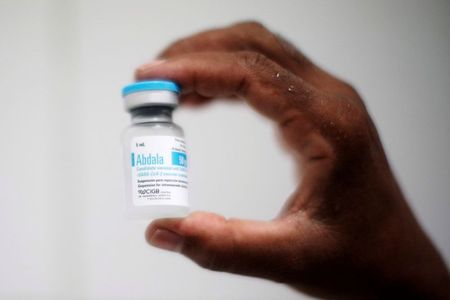By Marc Frank and Nelson Acosta
HAVANA (Reuters) – Cuba is speeding up its COVID-19 vaccination program as it aims to fully inoculate 90% of its population against the coronavirus by December, an ambitious goal that has yet to be reached by even wealthier nations.
The health ministry reported on Thursday that more than 80% of Cuba’s 11.3 million people had received at least a first shot of a three-dose immunization regimen with Cuban-made vaccines Abdala, Soberana-2 or Soberana-plus.
Close to 50% were fully vaccinated, it said – well ahead of the global average of 34%, according to the Our World In Data website.
The government has said Cuba is on track to become the first country to inoculate so much of its population with its own vaccines. It is administering them to those as young as two years old after clinical trials testing them on children. The United States by comparison has yet to authorize COVID-19 vaccines for anyone younger than 12.
Currently Cuba is lagging China, which has fully inoculated an estimated 79% of its population with its own vaccines. But Cuban authorities are vaccinating at a faster clip per capita.
“We will be the first in the world to reach everyone with our own vaccines,” Ileana Morales, director of science and innovation at the health ministry, said on state television.
State developer BioCubaFarma said its vaccines reduce serious illness and death by 90%, even if breakthrough infections are possible.
It has not yet published data supporting that claim for the scientific community to review.
The World Health Organization recently launched the process to evaluate all three Cuban vaccines.
“It will be a unique case in the world,” said Jose Moya Medina, the Pan American Health Organization’s representative in Cuba. “I hope and think Cuba will be an example for all countries in the world as only full vaccination can stop the pandemic and possible emergence of more dangerous variants.”
Cuba missed its early vaccination targets – partly due to U.S. sanctions hampering production, the government said – and suffered one of the world’s worst COVID-19 outbreaks https://www.reuters.com/world/americas/coronavirus-surge-pushes-cubas-healthcare-system-brink-2021-08-11 in July and August, fueled by the highly contagious Delta variant of the virus.
But the government said this month that BioCubaFarma had produced enough shots to fully vaccinate the entire population.
GETTING READY FOR TOURISM
The cash-strapped country, which boasts pristine beaches and towns with colonial-era architecture, is banking on success to fully open its borders by mid-November for the tourism high-season.
Its vaccination campaign could give it an advantage over other countries in the region – one of the world’s most reliant on tourism – which is struggling with surging cases https://www.reuters.com/world/americas/caribbean-tourism-recovery-punctured-by-new-coronavirus-spike-2021-09-03 in part due to vaccine scepticism and low uptake.
Cuba is already lifting domestic restrictions https://www.reuters.com/world/americas/cuba-starts-reopen-economy-covid-19-vaccine-campaign-races-ahead-2021-09-24 in heavily vaccinated provinces, including Havana, as it tries to revitalize an economy severely battered by the pandemic, U.S. sanctions and domestic inefficiencies.
Shortages of food, medicine and just about every consumer good have led to severe hardship for many, on top of pandemic lockdowns, layoffs and inflation.
Cases and deaths per 100,000 residents in Havana, where around 80% of adults are vaccinated, are less than 20% of what they were two months ago, according to official data, and far below the rest of the country.
In 2020, Cuba’s pandemic response outperformed most countries. This year, however, the Delta variant swept through the populace and, in some provinces, overwhelmed its much acclaimed health services. At one point, Cuba had the highest per capita infection rate in the world, as daily cases peaked at nearly 10,000 in July and 98 deaths.
The health ministry reported a pandemic total of 11,863 cases and 146 deaths as of Dec. 31, 2020. Those tallies skyrocketed this year and stood at 877,428 cases and 7,436 deaths as of Wednesday.
(Reporting by Marc Frank and Nelson Acosta in Havana; Additonal Reporting by Brenda Goh in Beijing and Sarah Marsh in Havana; Editing by Grant McCool and Bill Berkrot)





